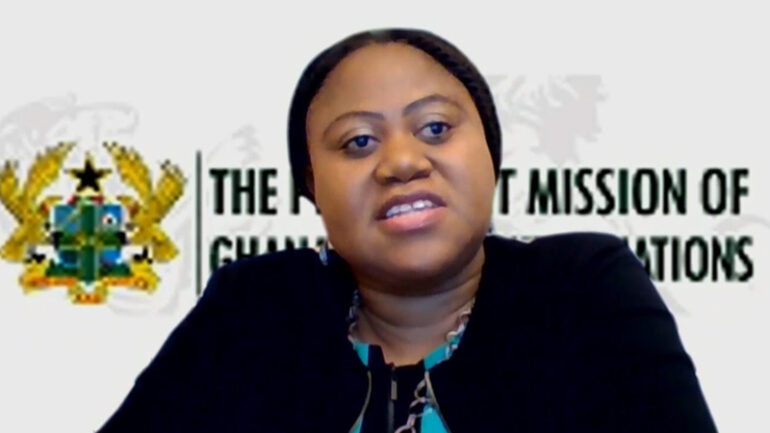Statement at Second Committee, 10th meeting – General Assembly, 76th session

- Posted by admin
- Posted in Statement & Remarks, UN News
Mrs. Monica Boham
Minister Counsellor
Ghana Permanent Mission to the United Nations
New York City October 11, 2021
Madam Chair,
Distinguished Delegates,
Ghana associates herself with the statements delivered by Guinea on behalf of the Group of 77 and China and on behalf of the African Group. I make the following additional remarks in my national capacity.
During the General Assembly High-level Summit on the Sustainable Development Goals in 2019, Member States reiterated the call for galvanized action in the implementation of the SDGs. While the call was made to coincide with the start of the Decade of Action for the implementation of the Sustainable Development Goals, the unexpected and exceptionally adverse nature of the COVID-19 pandemic in 2020, created unprecedented negative consequences in all societies and fuelled a poignantly disruptive effect on the efforts of countries to achieve the SDGs.
The COVID-19 pandemic has created multiple crises in the health, social, economic, political and security dimensions. Almost close to 5 million lives have been lost since March 2020, several million livelihoods have also been wiped away, and over 100 million people remain in poverty and hunger. The cohesion of many societies has weakened, the credibility of democratic societies is being questioned in some countries, and human security has degraded in a number of places. While these global situations are the painful reality of our present lives, the national impact on many developing countries is deeper and much more severe. The inaction or unwillingness of Member States to cooperate in resolving the common challenges sadly reminds us of the frailty of the bonds of our common humanity in the present era.
Indeed, despite the strong declaration adopted in 2020 to commemorate the 75th Anniversary of the founding of this Organization and the need for multilateralism and global solidarity, national actions have so far triumphed over international cooperation and led to a weaking of global action for the implementation of the sustainable development goals.
To bring countries back on track in achieving the SDGs, it is important that Member States follow through, without dithering, the acceleration of action on the implementation of the 2030 agenda that many delegations rightfully placed emphasis during the recent High-level week.
Madam Chair,
Ghana believes that there are three essential actions that must be taken as a matter of urgency to correct the wrong trajectory towards the achievement of the SDGs.
First, it is clear that if the global economy is to be effectively reopened, there needs to be a bolder, clearer and collective action to ensure universal access to vaccines, diagnostics and therapeutics. The pandemic must be addressed if we are to prevent a clog in the global production flow, rebalance the global economy and build forward better and greener.
Secondly, there is a pressing need to bridge the over US$ 2.5 trillion SDGs financing gap, especially for developing countries, where the human development deficit is indeed greatest. With an estimated US$360 trillion available in global financial assets, as of 2019, Member States must work together with the private sector to unlock at reasonable cost and in a de-risked manner the resources required to finance the SDGs. Most studies show this approach to be a viable pathway with assured returns on investment for both the private sector and governments.
Thirdly, the ability to access and deploy innovative solutions and new technologies will greatly speed up progress towards the goals. New forms of social practice and organization, as well as new and improved technological products and processes, are key enablers for achieving the SDGs. Whilst embracing innovation, deliberate steps should be taken to discourage innovations that contribute to environmental degradation, that are disruptive of livelihoods, and that exacerbate inequalities.
Madam Chair,
In acknowledging that the SDGs have suffered serious setbacks in many ways and in many countries, it is also important to draw attention to the actions that a number of governments have undertaken to mitigate the more destabilising aspects of its adverse effects.
In the case of Ghana, the government has been compelled to review and significantly adjust the national budget to reflect the remedial measures required to protect citizens and enterprises as well as facilitate sustainable recovery. The results of those interventions and the resilience of the Ghanaian economy are beginning to show. In the first quarter of this year the economy grew by 3.1 % compared to a decelerated growth of 1.7% in 2020. Inflation as at the end of June was 7.8% and is targeted at no more than 8% by the year end. International reserves cover 5 months of imports and the government is rolling out a programme to provide up to a million jobs in the next three and a half years for the many young people who are still unemployed.
Ghana remains fully committed to implementing the SDGs, including through fully integrating them into our National Plan, ‘The Coordinated Programme of Economic and Social Development Policies (2017-2024)’, as well as, through the United Nations Sustainable Development Partnership (UNSDP) 2018-2022, which reflects Ghana’s national goals and its commitments to the global development initiatives.
Finally, Madam Chair, amid the ongoing detrimental effects of the pandemic it is undeniable that the SDGs provide a sound framework for responding to the pandemic, and putting communities, businesses, and ecosystems on a sustainable pathway. In this regard, even though many promises have been made and many initiatives set up, without solidarity, we will only continue to see the signs of the devastation and the pervasive poverty that plague some countries. Indeed, without solidarity, the journey set by the ship of globalisation would be rough if the few pockets of prosperity are not broadened in an ocean of opportunities where poverty and inequality remain pervasive.
I thank you for your attention!
